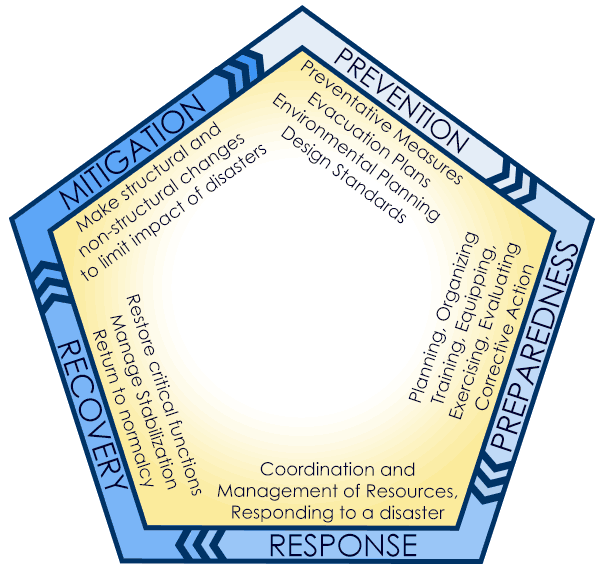Over the last 50 years, there has been a global increase in emergencies and disasters ranging from active shooters, acts of terrorism and state sponsored violence to hurricanes, wildfires, and earthquakes. With no end in site, The Intelligence Group has established a world-class Crisis Management Team that assists clients with emergency preparation, planning, and response. Cutting our teeth in the trenches of Hurricane Katrina over 20 years ago, we quickly learned what clients needed most.
The Intelligence Group’s global network empowers us to quickly respond to disasters anywhere in the world. We support our clients with the following services:
-
Emergency Management and Advisement
-
Security
- Computer or Network Breach Response
-
Evacuations
- Medical Evacuations
- Incident Evacuations
-
Field Hospitals and Emergency Medical Care
-
Logistics
- Tent cities
- Emergency fuel
- Power generation
- Shuttling of personnel
- PPE Equipment
- Communications
When preparing for the worst, partner with the best
Developing an emergency preparedness strategy often takes a back seat to business planning, workforce optimization, and other elements that have a direct and immediate impact on the bottom line. But in one of its few positive consequences, the COVID-19 pandemic has opened the eyes of organizations and industries to the importance of contingency planning. However, global pandemics and natural disasters are not the only emergency management threats our clients face.
Climate change has unleashed stronger and more devastating natural disasters. Terrorism, once relegated to distant third-world countries, now permeates the entire globe. Industrial accidents, such as chemical explosions and massive oil leaks, contribute to the problem.
The Intelligence Group has decades of experience providing emergency management consulting, training, and support services to help companies prepare for the worst.
As the emergency disaster management experts, we are well-equipped to help prepare local, state, federal, global, and partner organizations for any event, including health pandemics, natural disasters, and terrorism. Our end-to-end solutions include training, exercise-support, and staff augmentation solutions for organizations and public health institutions across the globe.
Plan. Prepare. Recover.
One of the most important aspects of emergency management is how your organization responds to a pandemic, natural disaster, or other emergency. The Intelligence Group has supported municipalities and organizations maintain their business continuity through a number of disasters, pandemic outbreaks and other incidents.
Preparedness Services
- Exercises – People often don’t know how to respond during an emergency. Preparedness exercises give them a chance to practice their own protocols before a disaster occurs. We offer functional and full-scale exercises that include senior leadership workshops to ensure teams are well-prepared should a disaster of any scale occur.
- Planning – Having a plan in place before an event occurs can save lives and protect investments in property and resources. Whether you need an emergency operations plan, an evacuation plan, or even an insurance policy review, our experienced emergency preparedness consultants will guide you to the best solution for your organization and community.
- Training – Different emergencies require different planning. The Intelligence Group provides customized and off-the-shelf training options to best suit unique emergency disaster management needs. As part of our comprehensive training services, our team analyzes emergency preparedness needs, designs and develops detailed plans, and implements customized training programs.
- Complete Program and Project Management – Government agencies and municipalities often must comply with stringent disaster preparedness regulations. From professional sports leagues to large municipalities, we design and implement customized preparedness programs that include fully compliant disaster response strategies.
The Five Phases Of Emergency Management
Prevention focuses on preventing human hazards, primarily from potential natural disasters or terrorist (both physical and biological) attacks. Preventive measures are designed to provide more permanent protection from disasters; however, not all disasters can be prevented. The risk of loss of life and injury can be limited with good evacuation plans, environmental planning and design standards.
Preparedness is a continuous cycle of planning, organizing, training, equipping, exercising, evaluating, and taking corrective action. Training and exercising plans is the cornerstone of preparedness which focuses on readiness to respond to all-hazards incidents and emergencies.
Response is comprised of the coordination and management of resources (including personnel, equipment, and supplies) utilizing the Incident Command System in an all-hazards approach; and measures taken for life/property/environmental safety. The response phase is a reaction to the occurrence of a catastrophic disaster or emergency.
Recovery consists of those activities that continue beyond the emergency period to restore critical community functions and begin to manage stabilization efforts. The recovery phase begins immediately after the threat to human life has subsided. The goal of the recovery phase is to bring the affected area back to some degree of normalcy.
Mitigation is the effort to reduce loss of life and property by lessening the impact of disasters and emergencies. Mitigation involves structural and non-structural measures taken to limit the impact of disasters and emergencies. Structural mitigation actions change the characteristics of buildings or the environment; examples include flood control projects, raising building elevations, and clearing areas around structures. Non-structural mitigation most often entails adopting or changing building codes.



